#spanish lessons
Note
hi, I was wondering when to switch between the imperfect and preterite tenses? I’ve been reading some spanish texts and I’ve noticed that the imperfect is the main tense used, but I also see the preterite thrown in sometimes.
I'll link to my other things I've done on this in a reblog since I'm on my phone atm but it comes down to narration vs action a lot of the time
In linguistic terms "perfect" means "completed" [lit. "thoroughly done"], so "imperfect" means "not yet completed"... the imperfect tense is used for things that may or may not still be happening or continuing, so it is often used for narration and description
Imperfect is often used for:
narration, description
continuous past ("was doing", "was eating", "was sleeping")
used to, was in the habit of
telling time - always imperfect (era la una, eran las dos, etc)
soler + infinitive as "used to" as past tense is ALWAYS imperfect; there is no preterite form accepted so you normally only see soler in present tense "to be in the habit of" and imperfect "used to"
Preterite is commonly called "simple past", where it is things that happened and are done, and they are actions
In terms of reading, it's more that imperfect introduces something and describes it, while the preterite shows an "interruption" or "the action"
A common example I like to use:
Dormía y sonaba el teléfono. = I was sleeping and the phone was ringing. [imperfect + imperfect; no interruption, background description]
Dormía y sonó el teléfono. = I was sleeping and the phone rang. [imperfect + preterite; involves an "interruption" of an "action" to the background description]
If you use the two imperfect, it sounds like someone was sleeping through the phone ringing, and/or that the phone ringing was part of the background. If you use imperfect and then preterite, it implies the preterite was a sudden occurrence that breaks up the narration.
...
But please be aware that most verbs can exist in the two different tenses and it becomes a matter of how they're understood...
Assuming 3rd person singular - se dormía would be "was falling asleep", while se durmió would be "fell asleep"
Sometimes it really depends on the mood - especially with ser and estar in preterite or imperfect - like you don't see too much difference between ¿dónde estabas? "where were you?" vs. ¿dónde estuviste? "where were you?" except in context where preterite feels more like interrogation "where were you (at that specific time)?"
...
There are a handful of verbs that change meaning depending on preterite and imperfect
I'll link things below that will explain it more but in general be wary of:
poder
no poder
querer
no querer
conocer
saber
haber
And also tener. Where normally tener is imperfect as preterite tener can come across as "to obtain", but there are so many idiomatic ways of using tener like "hungry", "thirsty", "hot/cold", and your age that there are times when preterite could be used. Still, in general, preterite tener is most often a synonym of conseguir or obtener as "to get"
-
Additional links:
A Linguistic Perspective on the Spanish Past
More in-depth explanation of imperfect
Using soler
The imperfect tag
The preterite tag
Preterite and Imperfect Contrasted from Bowdoin
Spanish Tenses & Moods Masterpost
#spanish#langblr#learn spanish#language learning#spanish lessons#asks#long post#la gramatica#preterite#imperfect#the eternal struggle
130 notes
·
View notes
Text
“Chill Spanish Listening Practice” is a great immersion podcast for beginners. It’s spoken in a pretty natural way (episodes are mostly improvised), but slowly. Even if you’re a higher level — the host has a really nice voice and I like to listen to it before bed jaja.
#spanish lessons#Spanish resources#resources#listening practice#langblr#language#linguistics#language learning#spanish#spanish langblr#quinn talks
139 notes
·
View notes
Text
I've started taking Spanish lessons on duolingo, actually quite enjoying it. One of the few apps I've actually left notifications on, I'm 8 days into a streak, just doing like 15mins a day. Idk something about it works for me, drives me to keep the streak up and do my lessons, even if I'm collecting a night owl streak as well cause i keep doing them super late lol
14 notes
·
View notes
Text

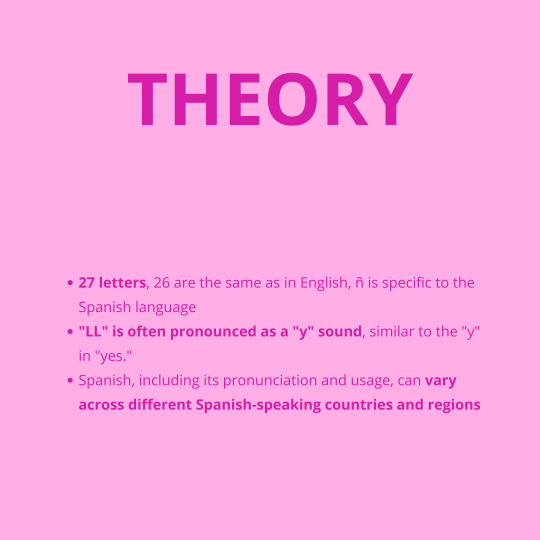
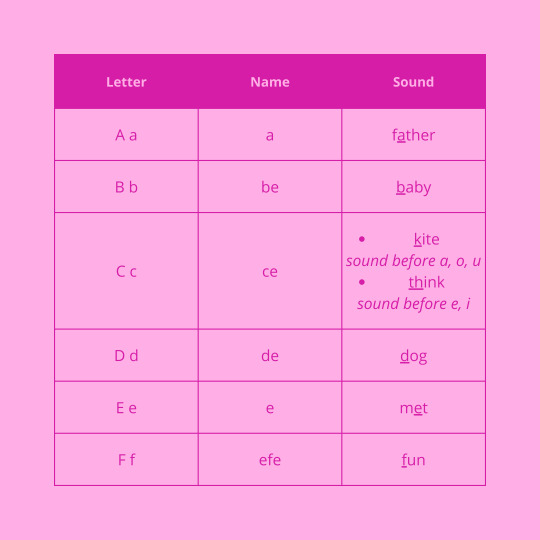
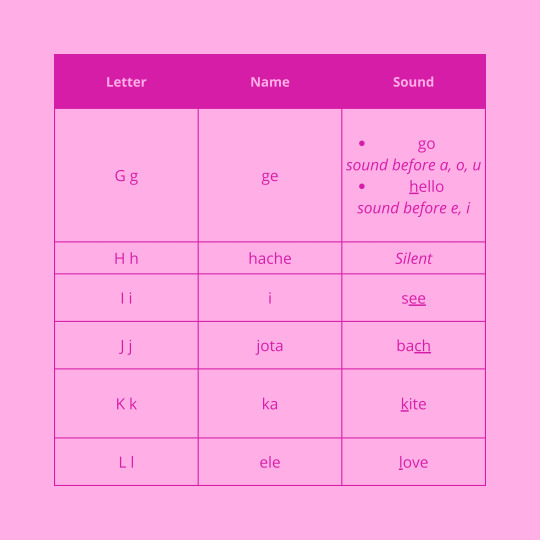
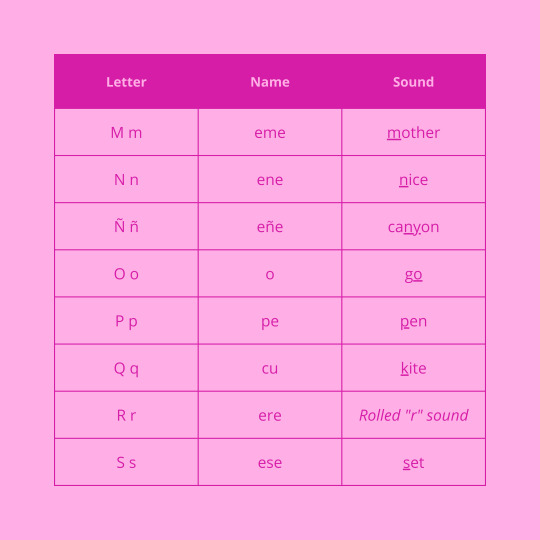
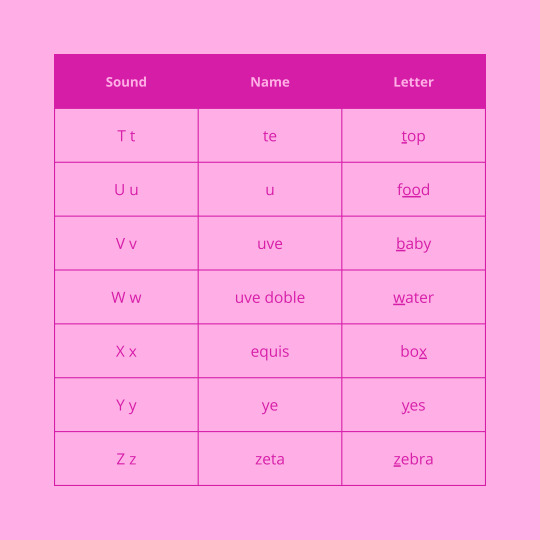
#alphabet#langblr#language#study#study notes#studyblr#notes#spanish#spanish language#spanish for beginners#spanish lessons#español#argentina
2 notes
·
View notes
Text
Did you know that while a large portion of the world is donning scarves and sipping hot cocoa amidst a snowy backdrop, many Chileans are celebrating their Christmas with the scent of sunscreen and the sound of ocean waves? That’s right! This is an important fact you need to know if you are planning a trip to Chile. Due to Chile’s geographical placement in the southern hemisphere, Christmas in Chile aligns perfectly with the onset of their balmy summer season.
#learn spanish#spanish#spanish lessons#basic spanish#spanish for beginners#spanish language#spanish vocabulary#spanish lesson#learn spanish fast#spanish phrases#spanish alphabet#learning spanish#speak spanish#spanish words#spanish pronunciation#spanish verbs
2 notes
·
View notes
Text
Look Mom, I’m starring in a lesbian rom com!
So, for most people on Tumblr, November 5, 2020 was bonkers. I’m sure you all remember it well...

November 5, 2020 was even more memorable for me because it was the day I met a beautiful, smart, talented girl, who would end up being my wonderful girlfriend, @xxxholicmaniac (Nat).
Tired of waiting for the election to be called, I posted some self-indulgent ‘I wish someone would tell me everything would be ok’ message, not expecting a stranger to do just that. Remember, 11/2020 was peak Covid times, so we ended up striking up a conversation amid the Destial Putin Election trifecta of madness. We realized we had some mutual followers and follows because we both were fans of Trixie, Katya and Drag Race, so I suggested we start vid chatting to watch the latest season together.
We became friends, then friends who flirted, then friends who did *more* than flirting.
The two of us live over 4,000 miles apart so I didn’t intend to fall in love with her. But I did. I couldn’t help it. Natalia didn’t give me any other choice.
We met in person for the first time in Mexico (halfway between me in California and her in Argentina) in December, 2021, just after our 1 year anniversary.
We were both nervous, worried our ‘Tumblr relationship’ wouldn’t translate to real life. But it was magic.

I got to go to Argentina for 6 weeks this summer and have never felt so happy, free and lucky in my life.
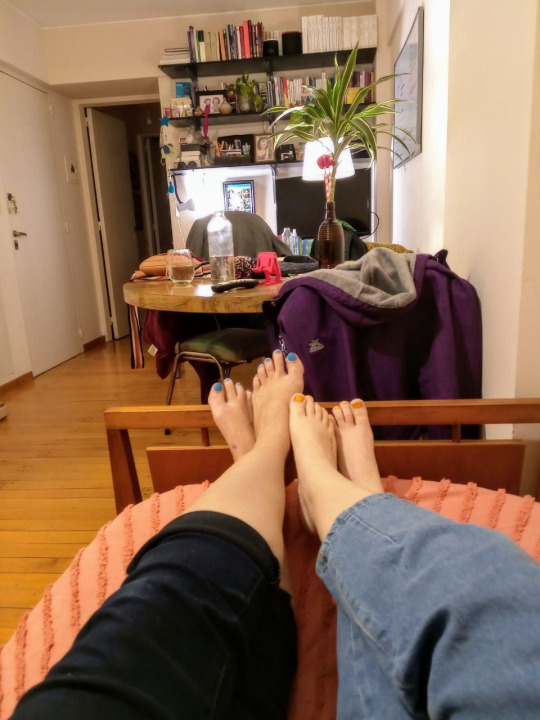
Being home now is hard. I miss Nat so much. But we video chat daily, and we’re planning another trip to see each other in December.
I hate to ask...but that’s what I need a little help with, though.
See, Natalia is amazing. She teaches Academic and Creative Writing Workships at the college level and is such a strong English speaker it’s hard to believe she’s not a native speaker. Nat is an great teacher and so easy to talk to. And she’s a really hard worker.
But the economy is shit in Argentina, Inflation is at 71% this year. Seventy one! And with all of that going on, Nat doesn’t have money to put towards seeing each other.
The good news is she’s a great Spanish teacher, and with the currency exchange can do Spanish tutoring or lessons over zoom for a really, really low price for anyone paying in dollars (Paypal). If you just want conversation practice, to brush up on your Spanish skills or to learn basics before a trip, she offers a half hour session for $15. If you’re taking classes and need help practicing, studying, making presentations or writing/editing papers, she does hour long sessions for $25.
She also is more than down to help with fanfics (Spanish/English). Basically anything related to writing. She worked at a publishing company and is a published author. She can also juggle empenadas (not really...well, she could try and see how it goes).
I normally don’t try to advertise anything on my Tumblr cause I’m only here to waste time and avoid thinking about capitalism just like everyone else, but Natalia’s too shy to put herself out there on her own, and I want to see my girl again as soon as possible.
So, if you could use some Spanish help for a super good price and would also like to help reunite some adorable Tumblr lesbians, message me or her and we can set something up. :)
#tumblr lesbians#lesbians of tumblr#useless lesbians#spanish#spanish lessons#spanish tutoring#tutoring#commisions#girls in love#xxxholicmaniac#homework help
29 notes
·
View notes
Text
SOL Spanish School & Tours
Website: https://www.solspanishtours.com/
Address: Inside of TASTE building, Convento Sn. Francisco, 1/2 block West, on Corrales St, Granada 43000
Phone: +50575306883
Business email: [email protected]
Unlock the fastest way to learn Spanish with Sol Spanish Tours, your go-to Spanish School in Granada, Nicaragua. We offer immersive Spanish courses for all levels, from beginners to advanced. Our experienced teachers and flexible schedules make us the top choice for Spanish learners. Choose from in-country or online courses and get ready to speak Spanish fluently in a few weeks!
Payment Methods: Cash, Bank Transfer, Paypal, MoneyGram, Wise, Bitcoin, Ethereum, USDT, USDC
Hours open: Monday to Friday: 8am to 4pm, Saturday and Sunday Closed.
#Spanish School#spanish school#spanish lessons#spanish tutor#spanish schools#spanish classes

2 notes
·
View notes
Text

Duolingo giving me the option to choose fighting words.
Translation:
I need more apples, Ana.
My choices:
1. The bank is here.
2. Two or three?
5 notes
·
View notes
Text
Spanish Lessons
Me: *trying to learn how to roll my Rs so I can speak Spanish like a proper Dominican*
dad: you need to learn this if you wanna like women
step-mom: yep
Me: 😀!!!?!!?
#*gay confusion*#Lesbian#Spanish lessons#Spanish#everyone on my dads side of the family speaks Spanish#The only reason why I didn’t learn Spanish earlier is because my biological mother didn’t like it#she felt left out or smthin#stfu mom we all know you were sleeping with other men#can you be lesbian and non-binary? I never got a proper answer-
5 notes
·
View notes
Text
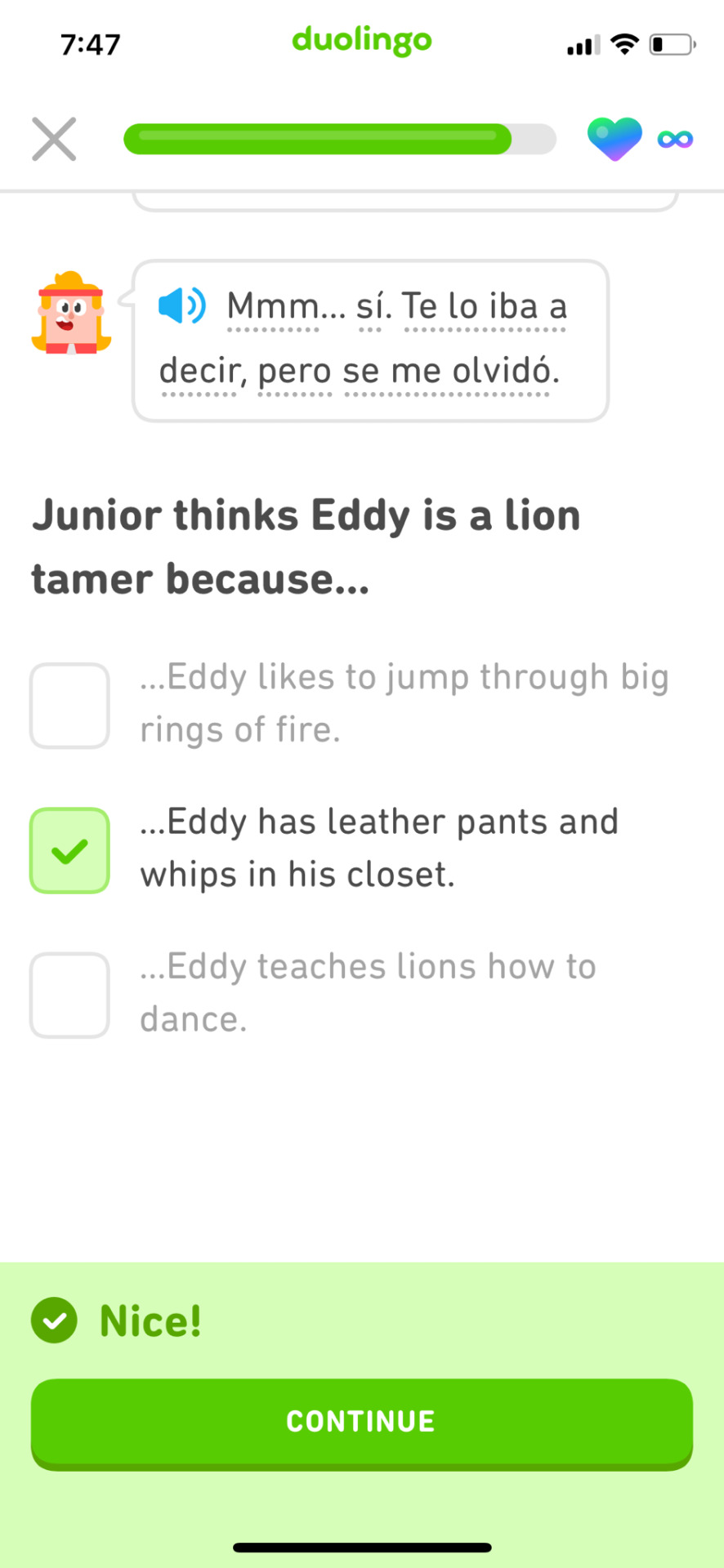
#duolingo#this one had me cackling#eddy’s son assumes he is a lion tamer because there’s leather pants and whips in his closet#spanish lessons
0 notes
Note
I was taught to use caminar for to walk in my Spanish classes but I see andar used way more often amongst native speakers. Is it just a dialect thing? Or is there genuinely a different implication with each one?
A few things, first is that andar isn't just "to walk" it's kind of like "to go around"
It can be used as "to walk", but it also carries some secondary meanings like "to wander" - or it can imply "to have the ability to walk" - so if you like zombie stuff you might see los muertos andantes "the walking dead" or los muertos andan "the dead walk"
andar is at its core actually related to ir and if you study Italian you'll see the link even stronger with andare.
In Spanish though, andar is irregular in the preterite tense and probably why they teach you caminar because caminar is very regular
...
The real difference is that caminar is "to walk" in the sense of physically walking, while andar is physical and figurative "walk/go/motion"
Also because caminar is the physical motion it gets used for talking about babies taking their first steps, having the ability to walk, going on a hike or walking for exercise etc
And because andar is more figurative it shows up in different idiomatic expressions
An example: andar/ir por las nubes is understood as "to have one's head in the clouds" but it's literally "to go/walk through the clouds"
You can also use andar in the "go around" sense - andas quejándose "you go around complaining" which implies more of a metaphorical "walk", but also a sense of habit or motion in general
Another one you might see is something like in Mexico andar crudo/a which is "to be hungover" [in Spain I think it'd be like andar de resaca] but it's like you're going, but you're still hungover - it's a sense of perpetual "motion" or continuation
When I think of caminar I specifically think of it as "to walk" like on two legs and it feels more like the physical specific function
[As far as something like "go for a walk" you might also see pasear "to stroll/to walk around", dar un paseo "to take a walk/to go for a stroll" or hacer una caminata "to go hiking"]
144 notes
·
View notes
Text

It's me, hi, I'm the teacher, it's me ♥
#louis tomlinson#fitf#faith in the future#fangirl#harry styles#taylor swift#español#spanish#languages#spanish lessons#argentina#learning#hs4#harries#louies#swifties#ttpd#ts ttpd
0 notes
Video
youtube
I Tried Learning Spanish for 30 Days with LINGODA | Lingoda Sprint Review
0 notes
Text
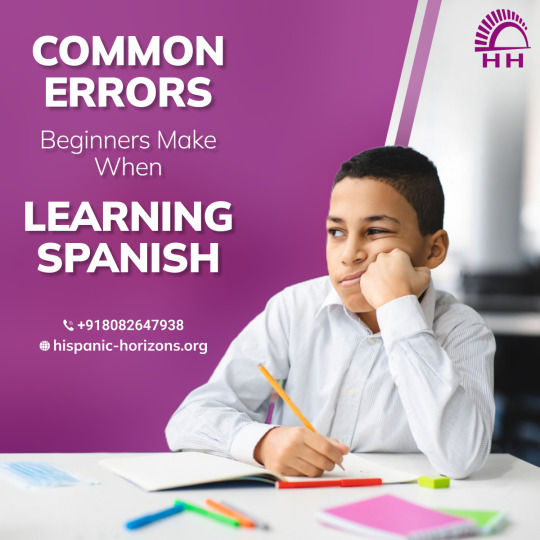
How Do Spanish Courses Immerse You in the Hispanic World?
A certified Spanish course leverages innovative teaching methods, immersion programmes, and cultural celebrations to create an immersive learning experience.
0 notes
Text
Did you know that in Panama, Christmas isn’t just a single day of festivities but a whole season brimming with unique traditions, colorful parades, and delectable culinary delights? This vibrant Central American country transforms into a festive wonderland during the holiday season, merging a rich tapestry of cultural heritage with contemporary celebratory practices.
0 notes